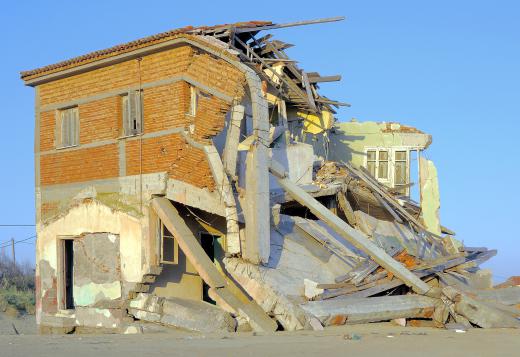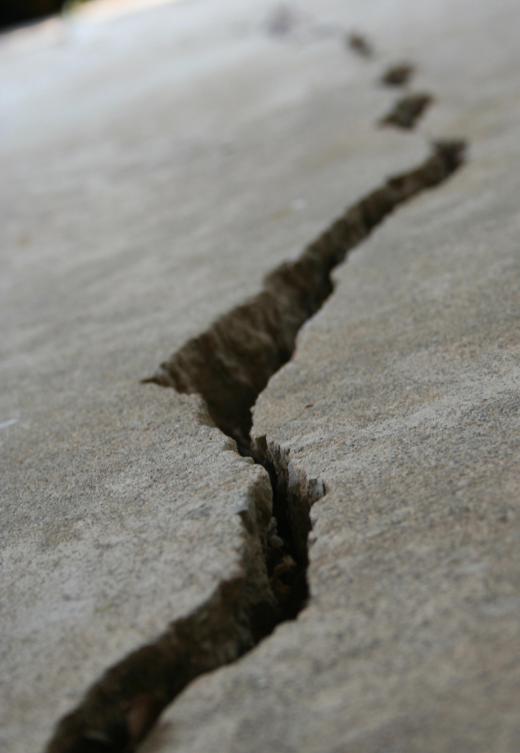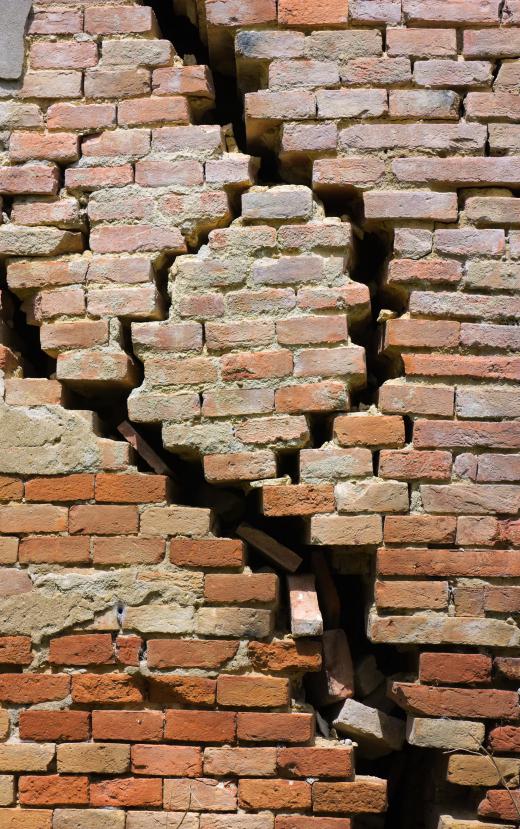What is an Epicenter?
 Mary McMahon
Mary McMahon
An epicenter is a point on the Earth's crust directly above the focus or hypocenter of an earthquake. People often mistakenly refer to the epicenter as the point of origin of an earthquake, but in fact this is not the case. The earthquake's origin lies below the surface, with the epicenter being the point on the surface directly above the origin. Earthquake damage tends to be most intense at the epicenter, although sometimes an earthquake behaves unexpectedly and the damage is heaviest elsewhere.
The hypocenter, also known as the focus, is the place inside the Earth's crust where a rupture occurs as a result of geologic stresses. The movement of a fault at the hypocenter causes a tremendous release of energy which spreads through the Earth, and can vary in magnitude. As one might imagine, the site on the surface directly above the rupture can experience significant shaking as a result of the release of energy. Finding the epicenter is important for geologists because it will help them locate the hypocenter, and they can use that information to learn more about that particular earthquake as well as earthquakes in general.

To locate the epicenter, scientists need readings from at least three seismographs in the region. They use the data from each seismograph to determine how far away it was from the epicenter when the earthquake occurred, and this data is used to triangulate to find the site on the Earth above the hypocenter. Computer programs are available to do this today, although historically it could be done with a compass and a map, by drawing circles around the location of each seismograph and looking for the point where the circles intersected.

When information about an earthquake is released, the data usually includes the site of the epicenter. Earthquake maps, updated on a regular basis in geologically active regions, show all of the earthquakes which have occurred within a set period, and point to the location of each epicenter for the convenience of people consulting the maps. Patterns on an earthquake map can also reveal trends which may be important, such as increased activity along a particular fault.

Knowing the location of the epicenter can also be important for disaster relief efforts, as it tells people where they should concentrate their energies. It can also be valuable when trying to make predictions about tsunamis and aftershocks, both of which can follow an earthquake and endanger relief workers and citizens.
AS FEATURED ON:
AS FEATURED ON:













Discussion Comments
@manykitties2 - For myself I am more concerned about my family's safety than living in an area that is famous for whatever reason. I think that with the growing amount of severe weather and earthquakes around the globe that people should be even more cautious of where they choose to settle down.
During most newscasts you always get an up close look at the epicenter of a quake if it falls on land, and the devastation near it is usually unthinkable.
I remember viewing pictures of the large Japan quake in early 2011 and being stunned at how much damage was caused by the tsunami that was triggered by the quake. Despite the epicenter being out at sea it still affected such a huge area.
I would never want to live near an epicenter of a strong earthquake so I avoid living near fault lines. Every time I watch huge disasters on the news I wonder why so many people are dead set on rebuilding at the sites of known active fault lines.
I find that the area around the ring of fire to be one of the most frightening places to live. While I know most people don't have a choice in where they live, for those that do I don't understand the mentality of choosing to live in a place so dangerous.
Do you think you would live on a seismically active area just to be in a popular city or near a famous beach?
I am guilty of being one of those people who thought that epicenter meant the area underground. My mind just associates such an urgent word with something direct, so my thoughts focused down deep in the crust.
I visited my cousin who lived at the epicenter of a big quake. The destruction to the apartment building where she once lived was complete. Large parts of it had been swallowed up by the earth, and some of her belongings she could never recover.
She referred to her former home as being down in the epicenter, so I guess that could have contributed to my thinking. I now know that she lived “in” the epicenter.
I remember back in the early 1990s when scientists were predicting the huge California earthquake. Even though I lived in Mississippi, the teachers were trying to teach us earthquake survival techniques. Our nearest fault line was in Tennessee, and maybe they thought that one would be disturbed into action by the great motion in California.
We had earthquake drills in which we had to get under our desks immediately. We also were told that doorways were a safe place to be. The school started collecting water bottles and cans of food in case of such an emergency. Though we would be extremely far from any epicenter, as kids, we naturally were very afraid.
I have always wanted to vacation in the Maldives, but the spot is primed and ready to be an epicenter. I can’t bring myself to face the possibility of a tsunami.
When that horrible earthquake occurred in Thailand that killed all those people, the Maldives were right in the path of the resulting tsunami. Many of the resorts and homes were totally destroyed.
If you have ever looked at an ocean calendar, chances are that you have seen photos of this beautiful place. It is so sad that the government had to request disaster aid for what was once paradise.
Post your comments